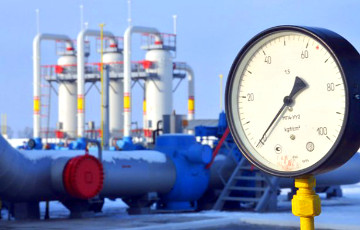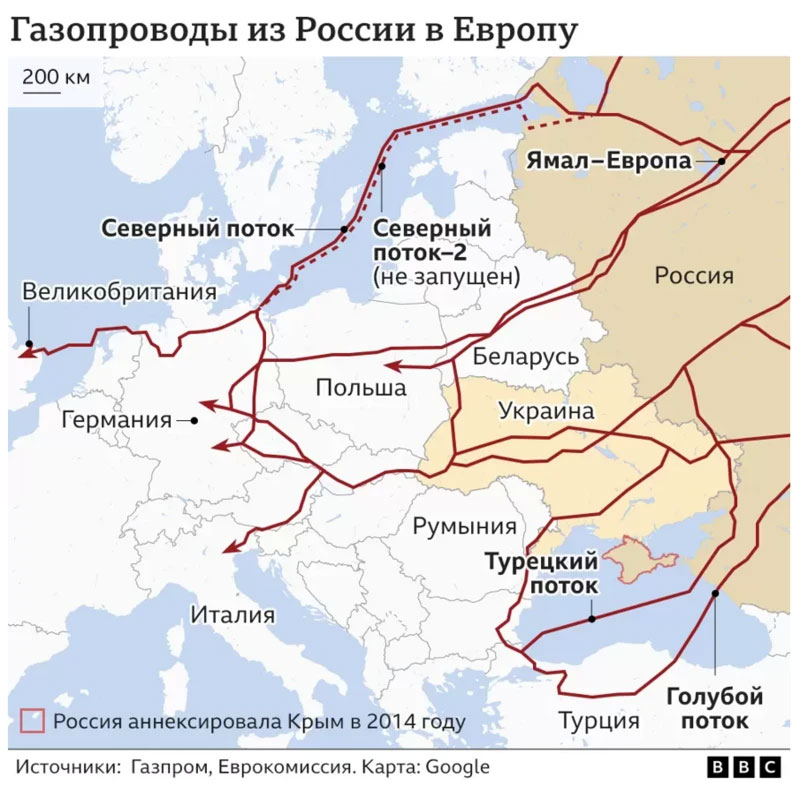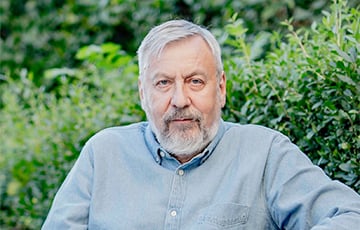Europe Has Finally Figured Out How To Give Up Russian Gas
9- 17.06.2025, 19:59
- 17,392

Details.
In the fourth year of Russia's aggression against Ukraine, the European Union has finally figured out how to cut off Russian gas to reduce the Kremlin's ability to finance the war and pressure EU countries. If the plan is implemented, by the end of 2027, Europe will buy neither pipeline gas nor liquefied natural gas from Russia, writes WBC.
The gainer will be the United States, the world's largest oil and gas producer and a key energy supplier to Europe. The losers will be the European fans of Russian President Vladimir Putin, represented by the authorities in Hungary and Slovakia. They are in no hurry to give up cheap Russian gas and are stalling EU sanctions against Russia for the war in Ukraine.
This is why Europe has gone the other way.

After Russia invaded Ukraine, the EU stopped buying Russian oil and coal, but it was harder to give up gas. Before the war, Putin had gotten Germany and other EU countries hooked on the gas needle, and a year before the attack on Ukraine, he launched a gas war against Europe, triggering an energy crisis.
In these conditions, the EU did not dare to impose sanctions against Russian gas, and later, when alternative supplies were established, the brake for sanctions was just Hungary and Slovakia, which behind the scenes sympathized with two other major clients of Gazprom - Austria and Italy.
The sanctions need the consent of all 27 EU countries, each has a veto. Plus, the sanctions need to be renewed every six months. The plan proposed Tuesday would bypass that hurdle and approve restrictions on Russian gas imports once and for all by a qualified majority.
"Russia has repeatedly tried to blackmail us and used energy supplies as a tool of pressure. We have taken concrete measures to permanently shut off the tap and put an end to the era of Russian fuel in Europe," European Commission chief Ursula von der Leyen said.
The commission's proposals (effectively, the EU government's) must be approved by the European Parliament and a qualified majority of the union's member states.
Hungary is against it again
The EU has long articulated a goal of abandoning Russian energy by the end of 2027, but until now could not figure out how to make it possible for European companies to declare force majeure and not pay penalties to Gazprom after refusing to fulfill the obligations of long-term contracts to buy Russian gas.
The easiest way was to impose sanctions on Russian gas like those on oil and coal, but no unanimity has been reached. The new plan proposes gradual trade restrictions on imports to protect the EU's energy security.
It is proposed to ban purchases under new contracts from January 1, 2026, under existing short-term contracts from June 17, 2026, and under long-term contracts by the end of 2027. At the same time, purchases of Russian liquefied gas will stop.
Hungary and Slovakia made an exception: they were allowed to import under short-term contracts until the end of 2027. However, they remained dissatisfied and are looking for new levers of pressure on the EU.
Hungarian Foreign Minister Peter Szijjártó threatened, for example, to stop the transit of electricity to Ukraine through Hungary - which is almost 40% of all Ukrainian imports from the EU.
"The European Commission's politically motivated plan to ban Russian energy is a serious mistake," the minister wrote on social network X. "It threatens energy security, drives up prices and violates our sovereignty. They want us to pay for reckless support for Ukraine."
Stop putting up with it
The EU has made no secret of the fact that the issue is political. And that the plan is not written for economic gain, but to support Ukraine and protect Europe from the Kremlin's energy blackmail and gas diplomacy.
"The European Union is sending a very clear message to Russia: enough is enough," European Commissioner Dan Jorgensen said when presenting a plan to get rid of Russian oil and gas dependence in May.
"We will no longer allow Russia to use energy supplies against us. We will no longer allow EU countries to be blackmailed. We will no longer help the Kremlin make money for war."
The EU had earlier banned purchases of Russian coal, oil and oil products. Before the invasion, nearly 50 percent of European coal imports and 27 percent of oil imports came from Russia. Now it is almost zero.
Gas imports have also declined, but for different reasons: The Kremlin tightened the tap, the main gas pipeline to Europe, Nord Stream, was blown up, and transit through Ukraine stopped. As a result, the share of Russian gas in European imports fell from 45% before the war to 13% last year, according to the European Commission.
So the Kremlin keeps earning euros for the war: in 2024, the EU increased its purchases of liquefied natural gas from Russia and paid it a total of 23 billion euros for energy, Jorgensen said.
America is on standby
Europe's rejection of Russian gas is in America's favor and could become an additional bargaining chip in the EU's complex negotiations with Donald Trump over the terms of a truce in his declared trade war.
The US, along with Qatar, has become Europe's main gas supplier following the Kremlin's decision to turn the tap on. Now the US could gain even more of a foothold in the world's richest European gas market.
The FT reports that US liquefied natural gas (LNG) now accounts for about 20% of European imports. The Trump administration expects to double LNG exports in the next five years, and the EU is the first candidate.
An increase in US energy purchases is also sought by Trump in negotiations on trade deals. The EU doesn't even need to make empty promises in this case: it will really need the extra gas.
That's why America is closely watching the fate of the EU plan announced today. According to S&P Global, the U.S. already has ready projects to produce liquefied natural gas for 45.5 million tons per year, tied to Europe's refusal of Russian gas from 2027.
If the EU suddenly decides to resume purchases from Russia in the event of a truce or the end of the war, the U.S. economy will not wait for the 120 billion dollars of investment planned for these projects.











